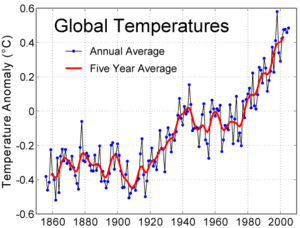.
Top Reasons to Buy a Hybrid Car: Difference between revisions
No edit summary |
68.4.102.159 (talk | contribs) No edit summary |
||
| Line 1: | Line 1: | ||
The best reasons to buy a [[Hybrid Cars|hybrid]]: | The best reasons to buy a [[Hybrid Cars|hybrid]]: | ||
[[image:global_warming.png|thumb| Many (but not all) scientists believe that there is a link between fossil fuel consumption and global warming.]] | [[image:global_warming.png|thumb| Many (but not all) scientists believe that there is a link between fossil fuel consumption and global warming.]] | ||
'''1. Pollute Less.''' [[Hybrid Cars|Hybrid cars]] produce up to 90% fewer emissions depending upon the type of hybrid: Belt Assisted, Integrated Motor Assist or Hybrid Synergy Drive. The ratio of the motor to engine power indicates the degree of hybrid integration in a vehicle. In pure electric mode and at stoplights, hybrids produce 0% emissions. | '''1. Pollute Less.''' [[Hybrid Cars|Hybrid cars]] produce up to 90% fewer emissions depending upon the type of hybrid: Belt Assisted, Integrated Motor Assist or Hybrid Synergy Drive. The ratio of the motor to engine power indicates the degree of hybrid integration in a vehicle. In pure electric mode and at stoplights, hybrids produce 0% emissions. | ||
Revision as of 04:36, 9 October 2006
The best reasons to buy a hybrid:
1. Pollute Less. Hybrid cars produce up to 90% fewer emissions depending upon the type of hybrid: Belt Assisted, Integrated Motor Assist or Hybrid Synergy Drive. The ratio of the motor to engine power indicates the degree of hybrid integration in a vehicle. In pure electric mode and at stoplights, hybrids produce 0% emissions.
2. Reduce Oil Dependency. Hybrid cars generally achieve 15% to 30% higher fuel efficiency. Trips to the gas station can be reduced. By mastering driving techniques, some hypermilers achieve in excess of 70 mpg in regular, daily use.
3. Support Future Hybrid Development. Every hybrid car sale expands the market, encouraging further investments by automakers in developing hybrid technology and lower manufacturing costs. Toyota's goal is to cut the hybrid premium by 50% in the next few years. These investments lower future prices of hybrid cars, creating a virtuous circle. In fact, the premium configurations, dealer markups and high demand has led every car maker to realize they have to have a hybrid, no matter how weak or strong, in their inventory.
4. Save Money. Resale value is much higher. Insurance is 10% cheaper. Gas is 10-50% less. Maintenance is comparable as these cars are very well made. Brakes last much longer reduced by regenerative electric charging. Faster commutes. Free tolls and parking. Lower taxes: the IRS has adopted large tax credits for purchase of new hybrid vehicles. The credits have a current maximum of $3,150. Note these are credits-- dollar for dollar tax savings-- not merely deductions. The credits vary by model (See Hybrid Tax Credits). The law that created the credits limits its availability to 60,000 vehicles from each automaker; meaning credits for popular models will be gone before the tax breaks scheduled Dec. 31, 2010, expiration date.
5. Why Not? Hybrid cars are just as comfortable and dependable as "regular" cars. Their electric motors are quiet and free from vibration for a smoother, quieter ride. They were invented 100 years ago by Dr. Porsche, the Prius is already 10 years old, and they are commonplace in society including washers, dryers, elevators, submarines, ships, trains, etc.
6. Use The Carpool Lane. In states such as California, Arizona and Virginia, some hybrids qualify for single-occupant use in carpool lanes. (This is controversial since it can "clog up" those lanes.)
7. Efficiency. Better gas mileage, much faster and stronger braking, better torque up short hills, smaller gasoline engines that burn fuel cleaner.
8. Waiting for Hydrogen. There are unsolved technical problems that make hydrogen fuel powered vehicles unlikely, regardless of the water by-product. There is an old proverb that "Perfect is the enemy of good enough." $1 million dollar fuel cell vehicles need to drop 95-99% in price to make an impact with electric vehicles already selling like hotcakes for under $10,000 all over the world.
See also Reasons Not to Buy a Hybrid Car (yet).

